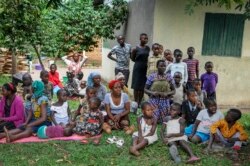U.S. Secretary for Health and Human Services Alex Azar has applauded Uganda's efforts to control the spread of Ebola in east and central Africa; however, while the U.S. remains the primary funder of Uganda's health care sector, the secretary did not shy away from asking the East African country to find funds to independently sustain its health care budget.
Since June, Uganda has identified and isolated four Ebola victims who entered the country from the Democratic Republic of Congo.
The monitoring has prevented the Ebola epidemic which has killed nearly 2,000 people in eastern Congo from crossing the border.
Secretary Azar is leading a U.S. delegation to Rwanda, the DRC and now Uganda regarding Ebola.
“There’s immense work that has had to be done in bolstering preparedness and response capacities. Screening those crossing the borders and responding to the discovery of cases. Uganda, particularly the Ministry of Health and Minister Aceng have risen to the occasion providing a model for the region," said Azar.
The U.S. is a major financier of Uganda’s health sector, helping to combat AIDS, tuberculosis, malaria, Ebola and improve maternal and child health care.
In fiscal year 2018, the U.S. provided more than $511 million in health care funding.
Secretary Azar encouraged Uganda to be more self-sustaining.
“And we have seen tremendous achievement in Uganda in terms of the building up of the public health system and health care infrastructure as a result of that partnership," Azar said. "Now of course, overtime that needs to be more self-sustained. And that does require that Uganda invest its own resources also in the health care system.”
Ambassador Deborah Malac expressed confidence Uganda is capable of meeting its own health care needs.
"But one cannot expect that the U.S. government will be the donor of choice in this area, you know, in an open-ended future," said Malac. "So, it really is about building its capacity and ultimately putting ourselves out of the assistance business.”
On Sunday, there were reports from Tanzania that a doctor who was studying in Uganda had died of a viral infection akin to Ebola. The Tanzanian ministry quickly came out and denied the allegations, calling them rumors.
Yonas Tegegn Woldemariam, the World Health Organization representative in Uganda, expressed concern about the situation.
“This mysterious disease has to be investigated and samples have to be tested. We couldn’t rule out any of the viral hemorrhagic fevers and the investigations will continue," Yonas said. "And we look forward of the Tanzanian government collaborating as per the International health regulations to address this issue.”
Countries near Congo continue to be on high alert for any new cases of Ebola, with strict adherence to control guidelines set by the WHO.






